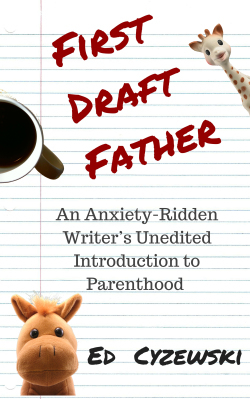Ed Cyzewski's Blog, page 23
June 24, 2015
We’d Rather Stay with the 99
Have you seen the size of our congregation?
Can you fathom how many lives have been transformed by our hard-working ministry… I mean, by the Gospel?
Our outreach programs and community service teams are missionally engaged in the surrounding culture. We have strong attendance numbers. Our baptism services are more packed than an MTV beach party—at least, what we imagine an MTV beach party would be like if everyone dressed super modestly.
While everyone’s writing about the decline of the church in America, we’re celebrating new salvation decisions every week. Our membership classes are always packed. We’re going to open a new campus next year that will expand the reach of the Gospel into yet another unreached suburb.
It’s true that some people have been damaged, spiritually abused, and manipulated by our pastor. We’re the first to admit that he has some flaws.
We say let him who is without sin cast the first stone. Our pastor is a sinner like everyone else who is no longer under condemnation. We are all under grace, and the least we can do is extend that same grace to the leaders who are running ministries that are too big to fail… I mean blessed by God with astounding attendance numbers.
We can’t let the gates of hell prevail against the church, can we?
We know some wounded people keep criticizing the spiritual abuse, manipulation, and all-male elder boards who use church by-laws and covenants to control people. It’s not our fault that these critics, at one time at least, wanted to follow our biblical model and signed up to join our congregation. It’s not our fault that they refused to abide by the covenant that we established through our culturally bound and arbitrary… I mean inerrant interpretation of God’s Word.
Yes, it’s true that some people have left the faith or have been deeply wounded because of our ministry. Shouldn’t any business… I mean empire… I mean church, expect some collateral damage?
Those calling for “accountability” and changes for our church and our leaders simply don’t understand the numbers involved in successful business… I mean church growth… I mean Gospel-centered ministry. It really all comes down to math… and some grace… especially for our leaders… but usually not for the people they hurt since aren’t preaching to thousands of people every Sunday.
Let’s deal in some round numbers for the sake of simplicity.
Say there are 100 people in our church (Not that we’ve ever had less than 150 since our launch in our pastor’s massive basement). Through the spectacular preaching of our pastor and the extremely male headship of our elder board, 99 of those people come to a saving knowledge of the Gospel, join the membership class, pledge to tithe regularly, volunteer on a regular basis, and begin reaching friends with the Gospel in order to expand our empire… I mean ministry. That’s amazing, right? What church wouldn’t dream of a 99% conversion rate?
However, let’s say that one person out of the 100 has a run in with our pastor, perhaps while he’s jet-lagged from speaking at a conference, or a disagreement with our elders who are simply asking for accountability that requires acquiescing to their demands despite everything that person believes about healthy personal boundaries. For the sake of argument, let’s say that person is deeply wounded and even spiritually manipulated, although we’re not sure how that could happen since people living under godly accountability technically can’t be manipulated. They just need to submit to their leaders and call it a day.
The wounded person may leave our church or the faith altogether. Either way, it’s not our job to cater to the whims and needs of one person. We have important work to do. We have 99 people to instruct in theology, to train in outreach, and to engage in our latest giving campaign.
It’s an unwise allocation of resources and the highly valuable time of our leaders to chase one person out of the hundred who wanders away.
If that one person out of 100 simply wanders away from the Gospel altogether in order to pursue a sinful lifestyle, then our hands are truly tied. If the Gospel has been preached and the elect have responded, what use is there in seeking out the one person wanders away?
Whatever the reason may be for one person wandering away or leaving our ministry, the key point here is that leaders need to keep focused on their vision and mission. If someone doesn’t want to “get on the bus” or play ball with your God-given vision and mission, then let them go.
Don’t leave the 99 behind in order to pursue the one who wanders away. That’s a terrible way to manage an organization or to fulfill a vision.
Pastors literally can’t afford to leave the 99 behind in order to pursue the one who wanders away.
Can you imagine the CEO’s of Fortune 500 companies doing such a foolish thing?
Stop thinking about the one who wandered away! Invest in the 99 who are committed to your vision… and to the Gospel.
We want to see the Gospel reach all people, not just one person. Judging by the size of our congregation, you should stop listening to our few critics and start taking notes on our church management… I mean, disciple-making process.
[A Note to Readers: In case you were wondering, yes, this is satire. It’s not based on a particular church. It addresses some broader trends I’ve observed and experienced in many churches and materials written for church leaders.]


June 23, 2015
Rohr for Writers: Your Downfall Can Lead to Resurrection
“If there is such a thing as human perfection, it seems to emerge precisely from how we handle the imperfection that is everywhere, especially our own. What a clever place for God to hide holiness, so that only the humble and earnest will find it! A ‘perfect’ person ends up being one who can consciously forgive and include imperfection rather than one who thinks he or she is totally above and beyond imperfection.”
There’s a rule that many writers and artists follow: some of your best work will come out of your deepest pain. If I quoted every time I’ve heard that at a writing conference or read books about this, I would just have a blog post full of quotes from other people.
So much of what we crave in our lives comes by first confronting our pain, failures, and struggles.
If you want intimacy with someone else, it will be forged by facing both relational and external struggles together.
If you want to excel at writing, you need to at least face your lowest points in life, your failures, your fears, and your anxieties. This is where some of your most authentic experiences can be found.
By the same token, if you want to grow in prayer, you also need to bring your sins, shame, and deficiencies to God. These are the raw materials of spirituality because they reveal all of the false commitments, false gods, and false identities that keep us from God and each other.
Our pain and failures aren’t just enshrined as a monument to our misery. They are transformed in the act of confrontation. Most importantly, we are transformed as well. In fact, if you want to reach any kind of lasting change that could make a difference in your own life or in the life of anyone else, you need to start here.
No matter what else you stick in front of failure, pain, or fear, these things will keep eating away at that false veneer.
No matter how much we force ourselves to get over it and to move on, we’ll continue limping until the source of the injury is healed.
We won’t experience relief and wholeness until our pain and struggles are transformed. You can’t find a way to go around this, you can’t make up enough rules to keep you safe, and you can’t teach yourself into becoming better or healed.
We’ll have the most to offer others, either through our prayers or our writing if we prioritize the fearless uncovering of our pain before God and on the page as we write. We don’t have to shout our imperfections in the street for all to hear or post them on our blogs for all to read—in fact, please don’t do either of those things!
This is the deeper soul work that takes place in quiet, secret places.
This is the foundation for our lives that determines the power of our art, the potency of our prayers, and sturdiness of our relationships.
Our pain and our struggles are most certainly an affliction in many ways, but that doesn’t mean we should run from them. Our greatest healing, creative work, and ministry to others will come through these very things that we had once seen as our downfall. If we bring the causes of our downfalls to God, we’ll find that they’re the very things that lead us to resurrection.
For a bit more about this topic, check out my book:
Pray, Write, Grow: Cultivating Prayer and Writing Together


June 21, 2015
Celebrate Father’s Day by Pre-Ordering First Draft Father for $.99
 Surprise! I’m celebrating Father’s Day by announcing my new book that’s “due” on July 14th and offering a $.99 pre-order on Kindle.
Surprise! I’m celebrating Father’s Day by announcing my new book that’s “due” on July 14th and offering a $.99 pre-order on Kindle.First Draft Father: An Anxiety-Ridden Writer’s Unedited Introduction to Parenthood
The Story
After a lot of promptings from friends and family, I converted my popular First Draft Father blog series and related posts into this book. I’m releasing it on July 14th in both print and a variety of eBook formats the ($.99 pre-order ends on release).
About First Draft Father
The only thing author Ed Cyzewski feared more than a rejection email was parenthood.
After struggling to establish himself as a full time writer in his 20’s, he began his 30’s with more questions about his career, more anxiety about parenthood, and a baby on the way. First Draft Father documents the rough draft of a new father’s experience working from home through a weekly journal. Along the way his faith and writing career were revised in ways he never expected.
Pre-Order it Today for $.99 on Kindle


June 15, 2015
Less Platform, More Sanity
I’m posting less on my blog these days, but I may be writing just as much compared to times past. The difference is that over half of my posts stay on my computer where no one else will ever read them.
I don’t feel bad about these unread posts. I needed to write them. Otherwise they would continue to buzz around in my head, demanding my attention and trumpeting their worth and, at times, “genius.”
In truth, I suspect that I would have posted almost all of them in the past. Such has been the pressure to pump up my blog numbers, to keep people engaged on social media, and to, let’s be honest, stir the post just a bit from time to time.
Now that I’ve stepped out of the traditional publishing platform rat race for the foreseeable future, I’m letting posts develop at their own pace and evaluating them with a far more critical eye. Some need a few weeks to settle into themselves. Others are ready to go after a bit of tweaking. And still far many more are done after the writing. The latter is a good thing.
I didn’t realize how badly I needed to just write things down and end it there. I often have an idea or the kernel of an idea bouncing around in my brain, and it can be such a relief to finally see it appear on a page. Once it lands there, I can make a sound judgment about its merits.
This has come into focus for me as I started praying with the Examen. Just writing out the good and the bad parts of my day on the “Examine” app provided clarity and a simple chance to vent a little. I have a moment of bracing honesty each day where I can tell myself, “There, I said it!”
I found that processing my issues in a private way via the Examen provided just as much if not more relief than a more public processing on my blog.
I still believe that blog posts are an important first draft of my ideas. I still think that blogging can be a helpful way to process ideas in public. I still love the idea of writing the best piece of short form content possible and then immediately finding out what readers think. As an author who develops book ideas for years, this immediacy is a blessed relief.
Every person who leaves his twenties behind and starts to stare down middle age or “old” age, whatever that is now, likes to think that some wisdom and gentleness has been added to the mix over time. Whether you call that moving from the first half of life to the second half of life, mellowing with age, or simply realizing that you were a bit of a jerk in the past, a bit of evolution on our parts strikes me as appropriate. I hope that I write differently ten years, twenty years, and even, gasp, thirty years from now.
At this point in my life, sacrificing a bit of consistency for the sake of picking only my best thoughts, rather than sharing ALL of my thoughts, feels like either a wise or a “less dumb” shift. I truly do need to write a lot, but it doesn’t all necessarily need to be shared.
Removing myself from the race to keep growing my blogging platform in order to catch a publisher’s eye finally gave me permission to let up a bit. I still care deeply about reaching more readers with my writing, but my higher priority is letting my work evolve at its own pace and recognizing that oftentimes my writing is only for my own eyes.
Perhaps it would be easier to write for others if I could first learn to write for myself.


June 10, 2015
Are Independent Authors Just Control Freaks with Issues?
I’ve been reading magazines, blogs, and books on publishing since 2005, and over the years I used to think the self-published or independent authors had some control issues. It wasn’t hard to arrive at that solution.
Almost every author or publishing expert who wrote about independent publishing or self-publishing listed CONTROL as either the main reason for choosing that path or at least one of the most attractive reasons to choose that path.
I imagined these controlling folks as the sorts of people who didn’t want someone to tell them to stop working on terrible books like The Wrath of Moragina the Sexy Sword Sorceress or The Jerusalem End Times Code Prophecy. And even if the books they wrote looked somewhat professional and the authors appeared somewhat competent, I still imagined that they were just outliers who refused to play by the accepted rules of publishing.
I used to think to myself, “Come on, get over yourself. You don’t need to control everything in publishing.”
Don’t you trust the people working at the publisher?
Don’t you want to work as part of a team at a publisher?
Aren’t you missing out on all of the good things publishers offer?
Now that I’ve worked in commercial and independent publishing for a good stretch of time, I can see why control is actually far more important for authors than I would have ever guessed. [Note: for the sake of clarity, I’m assuming Joanna Penn’s terminology here where self-publishing describes book publishing on your own as a hobby and independent (or Indie) publishing as book publishing on your own as a professional endeavor.]
While I’ve had lots of good experiences with my colleagues involved in traditional publishing and I’m deeply proud of the books I’ve produced, I also know first hand how independent authors miss out on the downsides of working with a traditional, commercial publisher. In fact, independent authors who play their cards right can essentially find work-arounds that help them reap most of the benefits of traditional publishing while gaining all of the benefits of publishing independently.
Did I mention that the control is great?
Sorry. Moving on…
While I didn’t enjoy independent publishing when I first tried it out in 2010, the changes in the tools available and distribution opportunities have made it far more feasible. In fact, I’m now prepared to defend the independent book publishing control freaks. I’m now one of them. Control is great. Have I mentioned that yet? In fact, once you gain control over your publishing career, you may never let go of it.
When control is good for independent book publishing:
I can jump on opportunities with price promotions or giveaways.
I can work with fellow authors easily and share my content with them immediately.
I can get immediate results on promotions and find out what works and keep doing it. [I have to wait until next January to learn how many sales the BookBub promotion for one of my traditionally published books got from this past January. Also? I split the cost of the promotion with the publisher.]
I can change mistakes in my books easily and even change titles and book covers if they haven’t performed well.
I can update previous books to include new links to my new books.
I can direct readers right to my own website and mailing list at the beginning and end of my books.
That isn’t to say that independent publishing is for everyone. There are some popular authors who are doing quite well and have no need to read this post.
On the other hand, there are many talented writers and bloggers who are languishing over book proposals and waiting for months to hear back from editors and agents who have inboxes flooded with projects they hardly have time to review. I can identify with the desire to publish commercially. I also wouldn’t give up that experience for anything.
However, if you want to write books, just start writing books today. Work with professional editors and designers, build your email list, and find fulfilling ways to connect with readers. Just resolve to write books no matter what if that’s what you really want to do.
Stop waiting for someone to give you the green light.
There are so many simple ways to create professional eBooks and print on demand books. There are plenty of editors (**raises hand**) who can help improve your books. There are more than enough competent designers.
Take risks. Make mistakes. Learn lessons. Ask for advice. Read reliable blogs. Keep working no matter what. No one can stop you from opening your computer or notebook in order to write—unless that person has stolen them from you and is running down the street with them.
Best yet? If you manage to publish independently, you’ll have complete control…


June 8, 2015
Rohr for Writers: How to Find the Enlightenment We Cannot See
“Any attempt to plan or engineer your own enlightenment is doomed to failure because it will be ego driven. You will see only what you have already decided to look for, and you cannot see what you are not ready or told to look for.”
-Richard Rohr, Falling Upward, 66
The most important turning points of my life and my faith have come when I have felt least prepared for them.
Rohr says it well here: we cannot see what we are not ready or told to look for.
Ironically, when God breaks into our world and pushes us beyond what we know and have experienced, that is the moment when we are “ready” to see it, even if the moment of realization is overwhelming and disruptive.
If I could hold onto an explanation of what prayer is capable of doing, it’s this sort of enlightenment where God takes us beyond ourselves. It’s the transforming power of the Spirit in our lives that makes the life of God apparent in us.
This is why prayer and writing can be particularly powerful when they work together: writers are seeking clarity and enlightenment through our creative work. We’re trying to get a slight edge, and it’s often very slight, on how everyone sees the world. We’re pulling back the fabric just a bit to say, “Hey, have you ever looked at things from this angle?”
If we’re just repeating what everyone already knows, why would they bother reading our work? That’s why the commonplace tropes such as, “Everyone knows…” or “It’s a time-honored adage…” are such terrible ways to begin any piece of writing. Every college composition teacher surely has hands raised, shouting “Amen!” at that point.
Prayer is a leap into the void of the unexpected. We don’t know where God will take us. If we have a clear map in mind of what’s supposed to happen when we pray, then we’re not actually praying. We’re just paying God lip service rather than entrusting ourselves to God’s loving presence. It’s not up to us to set the agenda when we’re in God’s presence.
Writing is a similar leap. We begin the creative process and submit ourselves to it. We go where it leads. Yes, we outline and take notes and write drafts, but we can only go where the process takes us. At a certain point we either ditch the project or polish it for wider distribution.
Whether writing or praying, the most important part of either process is the part you can’t plan out or see coming. They’re both leaps of faith, acts that put us in positions where could end up in a place that is beyond ourselves and leaves us forever changed.


May 26, 2015
I Would Rather Be an Atheist Than Attend the Village Church
When I compared the people who rejected Jesus with the people who accepted Jesus for a recent book project, there is one stark difference between the two.
Those who rejected Jesus had systems of religious practices and theological constructs to rely on and defend. When Jesus came to fulfill the law, impart the Spirit, and offer access to God outside of religious authorities, they saw him as a threat.
Those who accepted Jesus were generally the sinful outsiders who had little to no previous connection with God. They had been rejected by the religious institutions and the leaders who controlled the insiders and outsiders. They didn’t rely on laws or rules to get in with God. They were no doubt living in sin, but they also didn’t have a false sense of connection with God. They were ready to receive God’s genuine freedom, not a man-made counterfeit based on proof-texting and laws.
I’ve been following a recent series of events involving a missionary named Karen Hinkley affiliated with The Village Church in Dallas, a congregation that is led by Matt Chandler. Chandler, it should be noted, leads the Acts 29 Network, a church planting network that had long been affiliated with well-documented spiritual abuser Mark Driscoll until Driscoll’s misdeeds became too much of a liability.
I’ll offer a brief summary of the situation involving the Village Church. Karen (now Hinkley) and Jordan Root were serving as missionaries, Jordan confessed to viewing child pornography (and later admitted to abusing young girls when he was underage), Jordan also has a long history of being in situations with young, vulnerable children, Karen opted to annul the marriage and leave Jordan, the Village Church disagreed with Karen and placed her under church discipline, Jordan is allegedly a member in good standing because he “repented” despite his history of lying, Karen is under church discipline, and The Village Church has denied her request to terminate membership.
Karen has pleaded with The Village Church to be more forthcoming about the details surrounding her husband and has asked them to work diligently to uncover any inappropriate contact he may have had with children as proof of his repentance.
Rather than apologize for the creepy, cult-like “denial” to Karen’s letter terminate her membership, The Village Church dug in further and sent a rather terrifying self-justifying letter in which the church leaders described Karen as a covenant member who must abide by the counsel of her church leadership and work to restore her marriage. The biblical proof-texting in this letter is unfeeling and almost robotic. Any sense of empathy or common humanity evaporates so long as Bible verses can be piled up.
It’s as if Jesus said: “A new commandment I give to you, that you proof text one another: just as I have proof texted you, you also are to proof text another. By this all people will know that you are my disciples, if you proof text one another.” John 13:34-45, New Village Church Translation.
The Village Church has an allegedly air-tight, biblical rationale for everything, and that is their biggest problem. They can justify unreasonable expectations about exercising control in the lives of their so-called “covenant members” because they honestly believe they have the Bible behind them. They see themselves as the direct messengers of God who have correctly discerned the authoritative Word of God, and any disagreement with the “God-appointed” elders is a direct offense against God. How else can you explain such a heavy-handed, laborious response to Karen Hinkley when all they had to do was say, “Good bye”?
I would much rather start out at square one as an atheist or unrepentant sinner than place myself under the spiritual abuse, distortion of scripture, and controlling leadership of The Village Church. Honestly, such a closed, tightly regulated system will eventually fail many people eventually any way, so you may as well start out with a blank slate spiritually.
You won’t see your need for a savior if you’re constantly looking at the ways that the Bible makes you right.
While in seminary and in the years following, I have continually been challenged by the words of Jesus about this error: “You search the Scriptures because you think that in them you have eternal life; and it is they that bear witness about me, yet you refuse to come to me that you may have life” (John 5:39-40, ESV).
It’s not that The Village Church can’t preach the Gospel or hasn’t led people to salvation. It’s that the Village Church ties on burdens that people cannot bear and distorts or obscures the message of the Gospel with man-made laws. The Village Church leadership has a clean cup on the outside with shining scripture verses, but they distort a filthy inside that is rooted in over-reaching leadership and a lack of emphasis on love for the sake of being as “biblical” as possible. They have strained so hard at the gnats of “biblical leadership” and “biblical eldership” that they have overlooked the more basic commands to love one another.
I have been in conservative churches where these unhealthy dynamics have lead to spiritual abuse, judgment, severed relationships, and division. There is no doubt that people who are new to the Gospel without such a background are far better prepared to receive the Gospel. I’ve personally detoxed from negative church experiences for years and watched many friends do the same.
For every time I hear someone point to the “souls saved” by The Village Church or the Acts 29 Network, I’ll point them to the many friends I know who have either left the faith or struggled mightily for years to find peace with God after being exposed to such toxic theology and leadership.
I know that such a provocative post title must be difficult to read for people affiliated with The Village Church or who have benefitted from the work of Matt Chandler. I don’t write such words lightly. It’s my sincere hope that a post like this helps us have frank conversations about what healthy and unhealthy churches look like.
Most importantly, it’s my hope and prayer that the Village Church leadership rethinks the way it overreaches into the lives of covenant members. If they persist in their ways, I fear that they’ll be receiving a lot more requests to terminate covenant membership. Will they continue to deny the right of covenant members who disagree with them to leave?


May 1, 2015
The Unintended Consequence of Posting that I Won’t Review Books on My Blog
People are still sending me books to review.
I tried to warn authors and publicists that I wouldn’t be able to review their books on my blog and wrote a 3,000-word post with all kinds of ideas for getting book reviews. The overall number of requests has dropped, but they continue all the same.
As I tried to sort this out, I realized that there are some really interesting aspects of book publicity worth considering here. I’ll begin with the most obvious, at least to me, and move to the some deeper issues that may be difficult to see with clarity.
Publicists and Authors Didn’t See the Post
OK, I wrote a post about not reviewing books on my blog, but that doesn’t mean everyone saw it. I don’t assume every person requesting a review disregarded my post.
I need to do a better job of making that post visible on my site. It’s not serving the purpose I intended if I’m not helping more visitors find it. It’s really easy to neglect the internal functionality of my website. Heck, I don’t think my latest release was even listed on the “My Books” page a month after it released! I guess I should get on that in May.
Lesson learned!
Hope Springs Eternal for Some Authors
While some haven’t seen the post, I have also received requests from authors who begin their emails with something like this:
“I saw your post about not being able to read books or review them on your blog, and I don’t expect you to read my book, but I still want to send it to you…”
I applaud this optimism and determination, misguided though it may be. Hey, if you love your book, you should want everyone to read it. It’s just troubling to me that some authors believe in their books SO MUCH that they’re willing to waste a copy of it, let alone wasting their time sending emails to people who have publicly stated that they won’t do what’s being asked of them.
I’ve been there. I’ve taken long shots before. I don’t sit here in judgment, even if I was a bit miffed at first.
Too many authors are so focused on getting bloggers to do what they, the authors, want that they miss out on what a blogger could do for them. For instance, a regular reader of my newsletter dropped me a note asking for my feedback on a project. I was more than happy to spend five minutes offering my opinion. In fact, a simple ask like that means I could suggest other people who may read the book or places where he could find publicity. The sky’s the limit for potential networking at that point.
There is a world of difference between a five-minute favor and a potential three-hour slog through a PDF file.
I want every author to be filled with optimism and enthusiasm for their projects, but I also don’t want them to waste their contacts with fellow authors and bloggers. Sometimes shooting a bit low, especially if the person being asked doesn’t know you, can bring in the best return for your time.
Stop Relying on Other People to Make Your Book Successful
Besides the dogged optimism of authors, I think this trend of asking bloggers for reviews sometimes speaks to a deeper struggle that I personally spent years sorting out. Too many up and coming authors rely on other people for their success.
Mind you, the right person really can make or break your career. I’ve seen it happen to people with little to no credentials trump those with credentials simply because the right person opens some doors. However, this is rare, and the vast majority of us can’t reach more readers by tagging along with someone else’s success. We have to build our readers gradually, one person at a time each day rather than praying for a windfall from the right blogger or celebrity.
I spent far too much time coveting the support of celebrity authors or social media bumps from people with bigger platforms, hoping and praying that they would respond to my pleas via email for help. Even when I did land a great endorsement from a leading and trusted voice or a windfall of social media shares, that didn’t necessarily compensate for the limited connections I had with readers at the start of my publishing career.
This is one of those cases where a lot of misinformation about social media and endorsements converge with a few case studies of the extreme exceptions that become the norm for far too many. I completely overestimated the impact of endorsements, blog posts, and social media shares from influential people when it came to selling my books, especially when my books were only on sale for 30% off.
I won’t say that social media, blog posts, or endorsements can’t help your book. They can, especially if you’re offering a $.99 promotion. However, the context and specific situation matters a lot. One of my friends wrote a children’s book that helps kids not be afraid of the dark and he got a share from an extremely popular Twitter user who is a household name for many. That gave his book a huge lift (although I’m quick to say he had a massive network of his own to begin with!), but how many of us have a book with such a wide, instantly recognizable appeal or a reliable contact with a celebrity who is deeply invested in our work? Not many!
For the majority of us, we can certainly promote books through our blogs, social media, or endorsements from trusted authorities in our fields, but the real movement I’ve seen with my books has come by making longer lasting connections with readers who subscribe to my blog or my email newsletter. These are the people who are interacting with me on a regular basis and who will be most invested in my books when they release.
While there’s nothing wrong with using guest posts on other blogs to promote a book when it releases—hey, I’ve done it and will continue to do it—you may see a better long term investment in your time if you use blog posts to grow your blog or newsletter subscribers, keeping in touch with them, and then tell them about your next book when it releases.
Do you see the difference there? Too many authors have the promotion work backwards. We think of promotion as this thing we do to reach readers after the book is done, but it actually works a lot better if you build those connections before you even write the book. Then, when the book releases, you can ask your network of readers to buy your book and to share it on social media.
This could only be me and it may not last forever, but I have noticed a significant difference in the response to my newsletter vs. my social media posts: the former receives way more attention. Publicist Tim Grahl notes that it’s hard to dodge an email, but there are any number of reasons why a follower on social media with miss a post or a tweet.
I couldn’t have taken my first steps in publishing without other authors offering advice, support, and connections. I’m committed to doing the same for others. To that end, the most important piece of advice I can offer is to build your own network of readers. I assure you, it’s far more rewarding to interact with your own group of readers and celebrate a new book with them. The alternative is an author who spends release week begging bloggers and other authors to help promote a book. Yes, sometimes authors and bloggers will help out, but this is a small part of book publicity, not the center piece of it.
When one of my friends releases a new book, I’m one of the first people to offer a guest post slot or interview on my blog, but I also know that these posts usually receive the lowest amount of traffic on my blog.
I’ve worked on both sides of this as a blogger and an author, and it really does work to slowly but surely build your own audience and share your publishing journey with them. Best yet, once you have a better idea of who will be reading your books, you’re going to write better books that address the interests and concerns of your readers.
Perhaps the best thing that can happen to most authors is a firm “no” from a few bloggers. Blog publicity is an extremely hit or miss way to go about promoting a book. The sooner you try something else, the better.
Check out Tim Grahl’s Your First 1,000 Copies for a bit more insight into how a change in book publicity could look for you. Really, this book will help you make the most of your book promotion, far beyond what most publicists can offer. Then again, Grahl’s book also means you now have a ton of work to do.


April 30, 2015
Join My Book Lovers List and Receive Hand-Picked Free Books Every Month
If you read a lot of books and you’ve enjoyed at least one of my books, I like to think that you’ll enjoy reading the books I recommend. So that got me thinking:
What if I put together a list of free books every month that I personally recommend along with one of my own books?
There are some great book review services offered by publishers that hand out free books, but I usually unsubscribe from them because the selection of books is too broad for my taste. I’m picky.
Enter my new Book Lovers email list. You’ll receive a monthly email offering a curated list of free books, including a limited number of print copies you can order directly from the authors. The only catch is that I’d like a 2-3 sentence review if you finish a requested book–which honestly, is something I do for most books any way.
Sign up for the Book Lovers List, and I’ll send a monthly email with the following:
A free book from my own works each month (in any available format*).
A preview of a new or upcoming book from Anne Bogel of Modern Mrs. Darcy
At least two free hand-picked book offers (from other authors in any available format*).
Once you sign up, each monthly email will make it easy to order any book you like. There’s no obligation to read any of the books if they aren’t up your alley. And in case you were wondering, if you stick around on this list long enough, you’ll be able to read every single book I’ve written for free–for what that’s worth.
We only ask that you post a 2-3 sentence review on top sites like Amazon and Goodreads when you’re done reading any books you request. Reviews are becoming one of the most important assets for authors, and just taking a few minutes to post a review is extremely helpful for any author. Also make sure to note in the review that you received a free copy!
*Print books available only to continental US and Canada residents.


April 28, 2015
I’m Not Eager to Lose But I’m Working on It
I like to think I’m the most insecure person ever. You may disagree because you know for a fact that you’re actually way more insecure. Whether or not I own the title as the most insecure person ever, I’ll bet we can all relate to the desire to prove ourselves in order to alleviate our fears about ourselves.
What if I don’t fit in?
What if people mock me?
What if someone secretly resents me?
I want to prove that I’m OK and that I belong, and that can especially hold true with my faith and beliefs. I’ve spent a good deal of time demonstrating definitively that anyone who would ever question my beliefs or my place within a particular tribe is misguided, stupid, or just plain mean. I’ve devoted plenty of time devising ways to support arguments for either my place or the place of friends who hold to beliefs similar to my own.
It’s disconcerting when you spend the majority of your life considering yourself a Christian, and then someone comes along shouting, “Not so fast! I have definitive proof that you’re not only in error, you’re an enemy of your faith!”
Even if the claims are baseless, they’re still really jarring. We all want to prove that we’re OK and that we belong. No one wants to be left out of the group. We all have such a strong desire to belong that we’d rather fight back than lose an argument that could insert even the slightest bit of doubt.
This is why forms of black and white thinking or fundamentalism become so appealing. If you’re a true believer with flawless beliefs and practices, no one can call you out. Better yet, if you take the offensive against anyone who pushes against the boundaries, you become a hero and defender of the insiders. The defenders of the insiders are the least likely to be called out because they become indispensible.
If you’ve seen any of my Rohr for Writers posts and you’re familiar with Rohr, you may know that Rohr encourages more of a centered set approach to theology and life in general. We define and orient ourselves by what we’re pursuing rather than maintaining particular boundaries of beliefs. Centered set thinking believes that, in the case of Christianity, life transformation happens in the pursuit of Christ rather than in keeping a list of rules. You could say that the epistle to the Galatians directs us toward centered set thinking:
“You foolish Galatians! Who has bewitched you? Before your very eyes Jesus Christ was clearly portrayed as crucified. I would like to learn just one thing from you: Did you receive the Spirit by the works of the law, or by believing what you heard? Are you so foolish? After beginning by means of the Spirit, are you now trying to finish by means of the flesh?” Galatians 3:1-3, NIV
We are changed by what we pursue, not by what we defend.
IN order to adopt a more centered set approach to Christ that leaves the boundary making to others, it’s inevitable that we’ll have to step back and let them win. We’ll have to accept that in the eyes of some people we’ll have lost and become outsiders.
Along this line of thinking, Rohr writes about the lives of St. Francis and St. Clare in his book Eager to Love in order to make a case for preemptive losing. As you may guess by the title, Rohr argues that Francis and Clare weren’t eager for a debate. They were eager to love, and the most perfect way they found to love was from a non-competitive position. They chose to lose right from the start rather than minister out of influence, power, or control.
Rohr notes that Francis and his friars were mocked and abused in the early days of their ministry. People didn’t honor Francis and his friars because they looked like fools and losers. They had left money behind in order to beg for their daily bread. They left secure work behind to rebuild crumbling, abandoned churches.
Who would give these men money or food?
Who would go to their crumbling churches?
People beat them up, spat on them, and insulted them.
If Francis and his friars wanted to win, to be influential, and to belong to the class and power systems of their day, these insults would have been devastating. It’s a wonder that they didn’t give up.
However, they chose to begin by losing. Without wanting to win, they were free to love others. They didn’t fight for a place at the table. They set up their own tables where anyone was welcome.
There’s a really big challenge in looking back on the saints from so long ago: everyone wants to be on the same side as the saint in question. In fact, Rohr’s misgivings about his own Franciscan order are clearly evident throughout Eager to Love. Even the Franciscans aren’t sure how to live like St. Francis! It’s certainly tricky when an order established as an outsider receives a certain amount of insider status. All the same, Rohr’s portrait of Francis sticks with me and challenges me to think and live quite differently than what is natural.
My default in life is to fight for my place. I want to belong. I want to be liked.
Who would choose to let people mock him and laugh at him?
Who in his right mind would choose to be left out?
Who would choose to lose?
Perhaps a madman of sorts would choose to lose because he no longer wants to fight. He sees how empty that fight has left him. And when you’re tired of fighting, you may as well try something else.
I’ve grown weary of fighting for my place, even if I struggle daily with my desire to belong and to be respected. I don’t know what this will continue to look like each day, but I’ve been trying to stop fighting against my theological opponents as much as possible. I’ve long since tried to stop defending the boundaries of my faith in order to work on a more Christ-centered, centered set approach.
Nevertheless, I’m still tempted to defend the wisdom of a centered set approach. I would far prefer for my approach to become the majority position that is respected and honored—preferably with a book deal or two tossed in for good measure. I have a feeling that the people who establish themselves as the defenders and boundary keepers will generally work to solidify their positions.
I’m not sure how I’ll know if I’ve “succeeded” at losing, but I’m still giving losing a shot.
I’m eager to love, even if I’m still not eager to lose.
I suspect that my eagerness to love will be determined by how much I’m willing to lose.
Pick up My Latest Book on prayer and writing for $2.99 on Kindle:
Pray, Write, Grow: Cultivating Prayer and Writing Together














